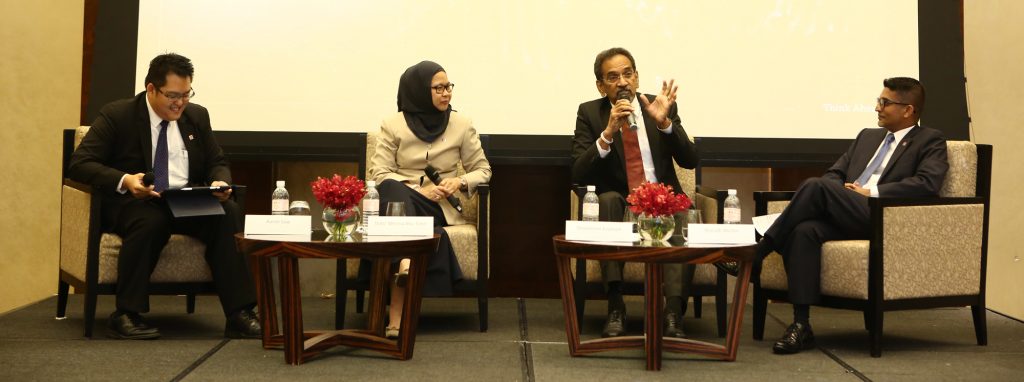To celebrate Global Ethics Day (GED) 2018 on 17 October 2018, ACCA Malaysia held a Breakfast Event at the Grand Hyatt Kuala Lumpur that also saw the launch of its month-long nationwide “Doing the Right Thing” i-Pledge campaign to create awareness among Malaysians and encourage the practice of good ethics.
The campaign, the first of its kind, encouraged Malaysians from all walks of life – the public, ACCA members and students, learning partners and employers – to sign an online pledge to commit to more ethical behaviour. Participants were invited to choose from six categories: environment, business, human rights, classroom, personal values and democracy.
In her welcome speech, Dato’ Merina Abu Tahir, Chair of ACCA Malaysia Advisory Committee and Head, Group Internal Audit, Malaysia Airlines Berhad said, “Being ethical is about doing the right thing even when no one is watching. Upholding good ethics is the responsibility of all, and together we can make a difference in the world, starting with ourselves and our country.”
The breakfast event also featured a thought-provoking panel discussion on the topic “What it means to be ethical and professional”, moderated by Aaron Saw, Head of Policy and Technical, ACCA Malaysia.
Sharath Martin, Regional Consultant, Professional Insights at ACCA ASEAN and ANZ defined it as: “Doing the right thing even when it is unpopular, even when it doesn’t do you any favours with those who are in power and asking you to turn the other way.”
Global Flexibility
Martin said that global organisations operating in many markets could balance codified ethics with flexibility in their ethical frameworks to accommodate cultural differences. For example, an organisation could have a universal rule against accepting gifts and bribes but this “could be nuanced in certain markets” where it might be customary to exchange gifts perhaps during festivals by setting limits on monetary value.
‘Technology doesn’t change ethical principles, but it narrows the window and timeframe that you have to respond to an issue,’ he said. ‘Say negative news emerges on social media, the organisation must move very quickly and balance speed and due diligence to respond.’ He noted that social media users also have a personal responsibility to exercise more ‘healthy scepticism. Don’t just believe what is circulating on social media; take a pause before you respond.’
Dato’ Merina said that emerging technologies such as robotics and artificial intelligence add another dimension to the ethical debate. “But if we remain true to the basics of the ethical code we can also address the ethical dilemmas arising from these.”
Concurring that tech is only an enabler, Devanesan Evanson, Chief Executive Officer, Minority Shareholder Watch Group added that, “Tech is the best guardian of our morality and our ethical values. It keeps us on our toes, because if we do something wrong it’s going to be viralised and it’s going to shape and influence opinions.”

Under pressure
Noting that all three panellists had experienced the Asian Financial Crisis and the Global Financial Crisis, Aaron asked about the challenges of doing the right thing under pressure and the impacts of unethical behaviour. Devanesan noted that ethical dilemmas don’t necessarily have to be large, such as document theft and collusion to commit fraud, but could be as mundane as validating your boss’ mediocre pet project to keep superiors happy and protect one’s rice bowl. “Leaders in power can control us in two ways, through fear or favour and incentives or disincentives.”
Where accountants and finance professionals are concerned, Martin pointed out two common unethical practices. One, underreporting actual hours worked i.e. “eating hours” or “kitchen tabling”. “When people think of ethics, it usually involves money. But when a person underreports, it creates a culture where people coming in after them are squeezed.” Repercussions of these include stressed staff and undervalued audits, for example. Two, earnings management that is misleading and misrepresents an organisation’s actual financial performance, with broader impacts on market returns and investors, for example.
To strengthen their ethical backbone, Dato’ Merina said that it is essential for accountants to behave ethically from the get-go to “build an ethical inventory” and “ethical reservoir”. Regardless of your role and level in the profession and organisation, accountants have to ask themselves: “Can I take that power and challenge ethically and walk away when pushed to take certain decisions? Kitchen table practices start when you are in a very junior role, so it is important that we always start to build an ethical reservoir so we don’t have that cancer eating at us and we have the courage to walk away even when we have reached the C-suite.”
To really change the ethical culture, Devanesan said that all of us have a collective responsibility to act. He urged Malaysians to stand up and speak out when they see wrongdoing instead of being apathetic. “When it comes to ethics, we don’t do anything wrong, but we don’t stand up when we see something wrong. We are not commissioners but omissioners. The culture of our organisations and the country must be such that we encourage people to stand up and say that it’s wrong.” This culture also needs to be embedded earlier for genuine change. “The education process to instil ethics and values needs to start earlier, even before we sit for professional modules or exams,” commented Martin.
Accountants must also refrain from using the law as a shield and rationale to behave unethically. Concluding the discussion, Aaron asked the panellists how to manage ethical dilemmas in practice. All three advised accountants to initiate discourse and conversation about their conflicts; don’t operate in silos.
More specifically, Dato’ Merina felt that it would be useful to establish a “platform for accountants to leverage on and seek assistance when facing ethical dilemmas – and that may be something that MSWG can think about.”
Martin recommended “building a consultative culture because you cannot be the only reservoir of what is right and wrong.” Tone from the top is another absolute. “Demonstrated behaviour at the C-level is absolutely key and we the ordinary people in organisations and society must also speak up to hold people accountable,” he added.
Devanesan warned of the dangers of groupthink in rationalising unethical behaviour. “Don’t surround yourself with people who think like you and yes-men. Surround yourself with good people who are bold enough to tell you that you are wrong. And don’t shoot the messenger!”
Finally, the breakfast culminated with participants being asked to make their i-Pledges at www.accaethicspledge.com. ACCA Malaysia targeted to collect 5,000 pledges; at the close of the campaign on 16 November 2018, more than 10,000 pledges had been collected online.







